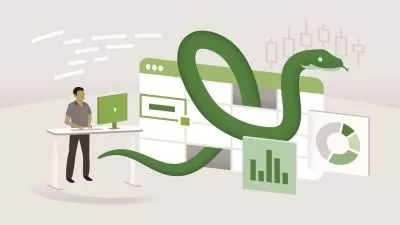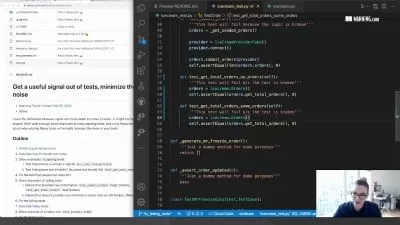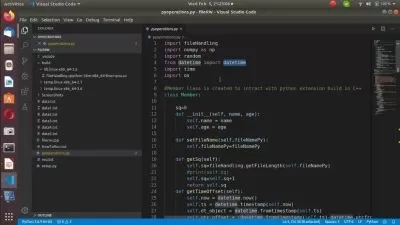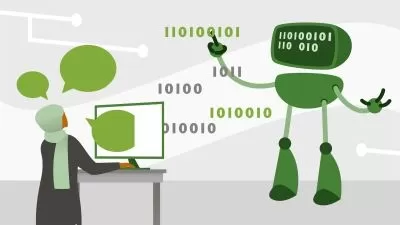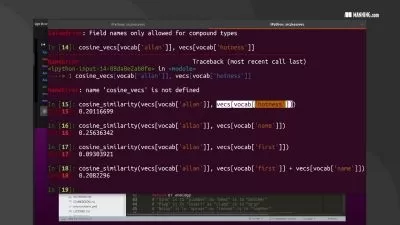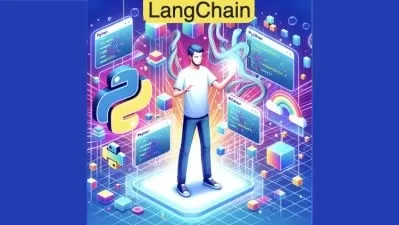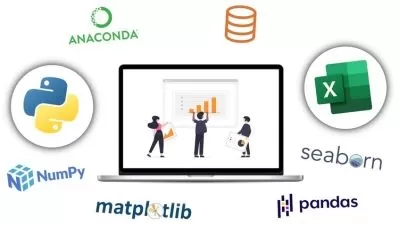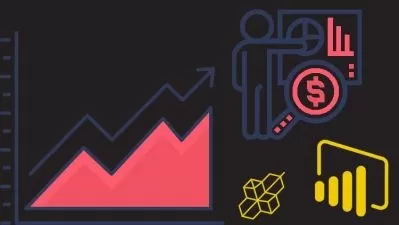Natural Language Processing For Text Analysis With spaCy
Minerva Singh
2:42:28
Description
Learn step-by-step Natural Language Processing (NLP) in Python using spCY! Work on practical NLP Projects!
What You'll Learn?
- Understand the basic concepts of natural language processing, including: part-of-speech, lemmatization, stemming, named entity recognition, and stop words
- Implement text summarisation and keyword search
- Understand more advanced concepts, such as: dependency parsing, tokenization, word and sentence similarity
- Implement text summarisation and keyword search
Who is this for?
More details
DescriptionNatural Language Processing (NLP) is a subfield of Artificial Intelligence (AI) to enable computers to comprehend spoken and written human language. NLP has several applications, including text-to-voice and speech-to-text conversion, chatbots, automatic question-and-answer systems (Q&A), automatic image description creation, and video subtitles. With the introduction of ChatGPT, NLP will become more and more popular, potentially leading to increased employment opportunities in this branch of AI. The SpaCy framework is the workhorse of the Python NLP ecosystem owing to (a) its ability to process large text datasets, (b) information extraction, (c) pre-processing text for subsequent use in AI models, and (d) Developing production-level NLP applications.
IFÂ YOUÂ AREÂ AÂ NEWCOMERÂ TOÂ NLP, ENROLL IN MY LATEST COURSE ON HOW TO LEARN ALL ABOUT NATURALÂ LANGUAGEÂ PROCESSING (NLP) ANDÂ TO DEVELOPÂ NLPÂ MODELSÂ USINGÂ SPACY
The course is divided into three main parts:
Section 1-2: The course will introduce you to the primary Python concepts you need to build NLP models, including getting started with Google Colab (an online Jupyter implementation which will save the fuss of installing packages on your computers). Then the course will introduce the basic concepts underpinning NLP and the spaCy framework. By this end, you will gain familiarity with NLP theory and the spaCy architecture.
Section 3-5: These sections will focus on the most basic natural language processing concepts, such as: part-of-speech, lemmatization, stemming, named entity recognition, stop words, dependency parsing, word and sentence similarity and tokenization and their spaCy implementations.
Section 6: You will work through some practical projects to use spaCy for real-world applications
An extra section covers some Python data science basics to help you.
Why Should You Take My Course?
MY COURSE IS A HANDS-ON TRAINING WITH REAL PYTHONÂ SOCIALÂ MEDIAÂ MINING-Â You will learn to carry out text analysis and natural language processing (NLP) to gain insights from unstructured text data, including tweets.
My course provides a foundation to conduct PRACTICAL, real-life social media mining. By taking this course, you are taking a significant step forward in your data science journey to become an expert in harnessing the power of text for deriving insights and identifying trends.
I have an MPhil (Geography and Environment) from the University of Oxford, UK. I also completed a data science intense PhD at Cambridge University (Tropical Ecology and Conservation). I have several years of experience analyzing real-life data from different sources, including text sources, producing publications for international peer-reviewed journals and undertaking data science consultancy work. In addition to all the above, you’ll have MY CONTINUOUS SUPPORT to ensure you get the most value out of your investment!
ENROLL NOW :)
Who this course is for:
- Data Scientists who want to increase their knowledge in natural language processing
- Students of Artificial Intelligence (AI)
- People interested in learning real-world NLP aplications
Natural Language Processing (NLP) is a subfield of Artificial Intelligence (AI) to enable computers to comprehend spoken and written human language. NLP has several applications, including text-to-voice and speech-to-text conversion, chatbots, automatic question-and-answer systems (Q&A), automatic image description creation, and video subtitles. With the introduction of ChatGPT, NLP will become more and more popular, potentially leading to increased employment opportunities in this branch of AI. The SpaCy framework is the workhorse of the Python NLP ecosystem owing to (a) its ability to process large text datasets, (b) information extraction, (c) pre-processing text for subsequent use in AI models, and (d) Developing production-level NLP applications.
IFÂ YOUÂ AREÂ AÂ NEWCOMERÂ TOÂ NLP, ENROLL IN MY LATEST COURSE ON HOW TO LEARN ALL ABOUT NATURALÂ LANGUAGEÂ PROCESSING (NLP) ANDÂ TO DEVELOPÂ NLPÂ MODELSÂ USINGÂ SPACY
The course is divided into three main parts:
Section 1-2: The course will introduce you to the primary Python concepts you need to build NLP models, including getting started with Google Colab (an online Jupyter implementation which will save the fuss of installing packages on your computers). Then the course will introduce the basic concepts underpinning NLP and the spaCy framework. By this end, you will gain familiarity with NLP theory and the spaCy architecture.
Section 3-5: These sections will focus on the most basic natural language processing concepts, such as: part-of-speech, lemmatization, stemming, named entity recognition, stop words, dependency parsing, word and sentence similarity and tokenization and their spaCy implementations.
Section 6: You will work through some practical projects to use spaCy for real-world applications
An extra section covers some Python data science basics to help you.
Why Should You Take My Course?
MY COURSE IS A HANDS-ON TRAINING WITH REAL PYTHONÂ SOCIALÂ MEDIAÂ MINING-Â You will learn to carry out text analysis and natural language processing (NLP) to gain insights from unstructured text data, including tweets.
My course provides a foundation to conduct PRACTICAL, real-life social media mining. By taking this course, you are taking a significant step forward in your data science journey to become an expert in harnessing the power of text for deriving insights and identifying trends.
I have an MPhil (Geography and Environment) from the University of Oxford, UK. I also completed a data science intense PhD at Cambridge University (Tropical Ecology and Conservation). I have several years of experience analyzing real-life data from different sources, including text sources, producing publications for international peer-reviewed journals and undertaking data science consultancy work. In addition to all the above, you’ll have MY CONTINUOUS SUPPORT to ensure you get the most value out of your investment!
ENROLL NOW :)
Who this course is for:
- Data Scientists who want to increase their knowledge in natural language processing
- Students of Artificial Intelligence (AI)
- People interested in learning real-world NLP aplications
User Reviews
Rating
Minerva Singh
Instructor's Courses
Udemy
View courses Udemy- language english
- Training sessions 35
- duration 2:42:28
- Release Date 2023/03/02






